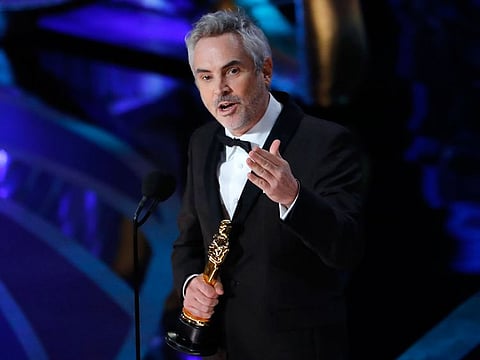Oscar-winning Hollywood director Alfonso Cuarón on Harry Potter: "I didn’t know anything about it"
At the Marrakech International Film Fest, director looks back on his career in Hollywood

“I didn’t want to do it because I didn’t know anything about Harry Potter,” Alfonso Cuarón admits. It was only after a blunt call from Guillermo del Toro—“Pinche mexicano flojo (lazy Mexican), go immediately and buy the books!”—that he gave the series a chance. What followed was a transformative experience, with Harry Potter and the Prisoner of Azkaban becoming one of the most critically acclaimed films in the franchise and a crash course in visual effects for the visionary director.
Known for his boundary-pushing storytelling and technical mastery, Cuarón is a two-time Oscar-winning filmmaker, celebrated for Gravity (2014), Roma (2019), and Y Tu Mamá También. His Oscars for Best Director and Best Cinematography have cemented his legacy as a true innovator in cinema. In this candid conversation at the 21st edition of the Marrakech International Film Festival, he reflects on his diverse career, his philosophy of embracing the unknown, and why he considers cinema a “beautiful curse.”
Q: Your films are so different from one another. Why is that?
That’s probably a flow of being more a cinephile than a filmmaker. I grew up loving so many films, and so diverse, that I was inspired by all of them. Once I do something, I kind of get bored of it. I need to explore something completely different—I feel I want to be challenged. I tend to want to do films where I have no idea how to do them. If I think about a project for two months and realize I know how to make it, I start losing excitement.
Q: Filmmaking seems like a lonely job that requires sacrifices. How is cinema part of your life when you’re not actively creating?
It’s present all the time—it’s almost like a curse, a beautiful curse. I love watching films, revisiting the old ones, and staying connected to what’s happening now. As a filmmaker, if you’re not connected to what’s happening, you become irrelevant. I’ve seen filmmakers I admire become cautionary tales because they didn’t connect with new cinema or the world, and their later films became more irrelevant. It’s important to connect with the new masters because there’s only so much you can get from the old ones.
Q: Are there contemporary directors whose work you admire?
Yes, definitely. For example, Robert Eggers has a very specific vision in his films. I haven’t seen Nosferatu yet, but I really want to. Ari Aster’s Beau Is Afraid is an incredible film. And there’s a very bright generation of filmmakers in Mexico, especially female directors, who are confronting very dark and tough territories in their work.
Q: Your films often take several years to make. Does the initial desire to tell a story ever fade during that time?
Oh yes, no question. The time it takes has to do with financing, prepping, and the frustration of projects falling apart. I’ve learned to let go—if something isn’t happening, I move on. Sometimes the project comes back later, and sometimes it doesn’t.
Q: You’ve said Y Tu Mamá También was an idea you had for years. Why did you wait to make it?
That idea came to me when I was about 12 years old, and I considered it for my first feature. But I wasn’t ready at the time. I was still in a phase of learning how to make films on a technical level rather than committing to a personal language. Years later, I was finally ready to make it unapologetically my own.
Q: How did you end up directing Harry Potter and the Prisoner of Azkaban?
I wasn’t planning to do it. Guillermo del Toro convinced me. He called and asked, “Have you seen the Harry Potter films? Have you read the books?” When I said no, he scolded me. He told me to go immediately and buy the books. He said, “If you approach it honestly and surrender yourself to the film, you might end up doing something good.” So I gave it a try. It turned out to be one of the best experiences I’ve had in filmmaking—a crash course in visual effects and a deeply rewarding project.
Q: Do you revisit your own films?
Rarely. A Little Princess is the exception. Guillermo del Toro once told me, “When your daughter is eight, you have to watch it with her.” And I did. It’s a film I love and have fond memories of making, though I haven’t rewatched most of my other work.
Q: Some directors delegate action or visual effects scenes. Have you ever considered that approach?
I’ve heard of that, especially with big franchises like Marvel. Years ago, I was offered a Bond film, but the idea was that I would shoot the dialogue scenes while a separate team handled the action sequences. That felt disconnected, and I turned it down. Some films are better left for others to make.
Q: How do you balance personal projects with studio films?
I don’t separate them. It’s more about the needs of the moment. Some films, like Y Tu Mamá También, come from something deeply personal. Others, like Harry Potter, are about stepping into an established universe and doing my best within it.
Q: Looking back, what do you think distinguishes your earlier work from your later projects?
My early films were like going to school—learning how to make films. Later, with Y Tu Mamá También, it became about expressing something that was unapologetically mine. Every film reflects a bit of yourself—it’s impossible not to. Whether it’s a deeply personal story or a project like Harry Potter, there’s always a piece of you in it.
Sign up for the Daily Briefing
Get the latest news and updates straight to your inbox

